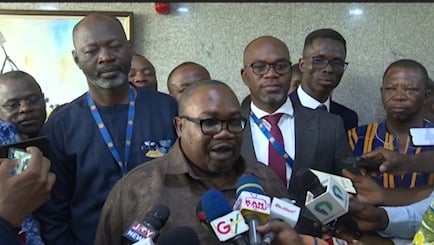The Ghana Registered Nurses and Midwives Association (GRNMA) and the Health Committee of Parliament convened a crucial meeting to address the ongoing nurses’ strike, a situation stemming from unresolved conditions of service negotiations and persistent welfare concerns. The meeting, spanning four hours, involved extensive discussions between the GRNMA executives and committee members, aiming to bridge the divide and forge a path towards a mutually agreeable resolution. Dr. Mark Kurt Nawaane, Chairperson of the Health Committee, subsequently announced that the GRNMA executives requested to consult with their council before proceeding further, signaling a need for internal deliberations and a more informed response to the proposals presented. While the specifics of the discussions remained undisclosed, both parties expressed optimism and a commitment to finding a solution that addressed the needs of all stakeholders. Dr. Nana Afriyie Ayew, Ranking Member of the Health Committee, echoed this sentiment, emphasizing the fruitful nature of the deliberations and expressing hope for a positive outcome following the GRNMA’s consultations with their council.
The meeting drew a significant presence, including the Minister of Health, Mr. Kwabena Mintah Akandoh, the Majority Leader, Mr. Mahama Ayariga, and officials from the Fair Wages and Salaries Commission and the Ministry of Finance. This underscores the gravity of the situation and the government’s recognition of the need for swift intervention. However, the Minister of Health remained tight-lipped about the meeting’s outcome and the government’s subsequent course of action, leaving the public and the affected nurses in anticipation. The meeting sets the stage for further negotiations and potential agreements, offering a glimmer of hope for resolving the impasse and restoring normalcy to the healthcare sector.
The nurses’ strike, initiated by the GRNMA, stems from allegations of the government’s failure to address critical concerns regarding allowances, accommodation, and overwhelming workloads. These unresolved issues have fueled discontent and prompted nurses to take drastic action, impacting healthcare delivery across the nation. The strike has caused significant disruptions, forcing many public hospitals to scale down operations or shut down entirely, leaving patients vulnerable and exacerbating the strain on the already burdened healthcare system. The GRNMA, representing the interests of nurses and midwives, seeks to secure improved working conditions, fair compensation, and a more manageable workload for its members. They argue that these improvements are not only essential for their well-being but also crucial for ensuring the provision of quality healthcare to the Ghanaian population.
The nurses’ demands encompass various aspects of their professional lives, including enhanced allowances to compensate for the rising cost of living and the demanding nature of their work. They also seek improved accommodation facilities, recognizing the importance of decent housing for their rest and recovery, which ultimately impacts their ability to provide optimal care. Furthermore, the GRNMA has raised concerns about excessive workloads, asserting that nurses are often stretched thin, jeopardizing both their own health and the safety of their patients. They advocate for a more balanced workload distribution to ensure sustainable working conditions and prevent burnout among healthcare professionals.
The government’s response to the strike and the subsequent negotiations will be critical in determining the future of healthcare in Ghana. Finding a sustainable solution that addresses the legitimate concerns of nurses while balancing the financial constraints faced by the government will require careful consideration and a commitment to compromise from both sides. The outcome of the ongoing dialogue will have far-reaching implications, not only for the striking nurses but also for the millions of Ghanaians who rely on the public healthcare system for their medical needs. A successful resolution will not only restore vital healthcare services but also foster a more positive and productive relationship between the government and healthcare professionals.
The gravity of the situation underscores the importance of finding common ground and ensuring that the voices of nurses are heard and their concerns addressed. The ongoing discussions between the GRNMA and the government represent a crucial step toward resolving the impasse and restoring stability to the healthcare sector. The outcome of these negotiations will undoubtedly shape the future of healthcare in Ghana, impacting both the well-being of healthcare workers and the quality of care available to the population. It is imperative that all stakeholders approach the discussions with a spirit of collaboration and a genuine desire to find a solution that benefits all parties involved. The future of healthcare in Ghana hangs in the balance, and the resolution of this conflict will have lasting implications for the nation’s health and well-being.














